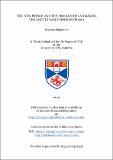The ‘New Prince’ and the problem of lawmaking violence in early modern drama
Abstract
The present thesis examines the fraught relationship between the sixteenth-century formulations of the theories of sovereign violence, tyranny and usurpation and the manifestations of these ideas on the contemporary English stage. The thesis will attempt to trace an evolution of the poetics of English and Scottish political drama through the early, middle, and late decades of the sixteenth-century in conjunction with developments in the political thought of the century, linking theatre and politics through the representations of the problematic figure of the usurper or, in Machiavellian terms, the ‘New Prince’. I will demonstrate that while the early Tudor morality plays are concerned with the legitimate monarch who becomes a tyrant, the later historical and tragic drama of the century foregrounds the figure of the illegitimate monarch who is a tyrant by default. On the one hand the sudden proliferation of usurpation plots in Elizabethan drama and the transition from the legitimate tyrant to the usurper tyrant is linked to the dramaturgical shift from the allegorical morality play tradition to later history plays and tragedies, and on the other it is reflective of a poetic turn in political thought which impelled political writers to conceive of the state and sovereignty as a product of human ‘poiesis’, independent of transcendental legitimization. The poetics of political drama and the emergence of the idea of ‘poiesis’ in the political context merge in the figure of the nuove principe: the prince without dynastic claims who creates his sovereignty by dint of his own ‘virtu’ and through an act of law-making violence.
Type
Thesis, PhD Doctor of Philosophy
Collections
Items in the St Andrews Research Repository are protected by copyright, with all rights reserved, unless otherwise indicated.

